Grand Piano Blu-ray Movie
HomeGrand Piano Blu-ray Movie 
Magnolia Pictures | 2013 | 90 min | Rated R | May 20, 2014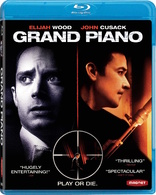
Movie rating
6.2 | / 10 |
Blu-ray rating
| Users | 0.0 | |
| Reviewer | 3.0 | |
| Overall | 3.0 |
Overview
Grand Piano (2013)
Moments before his comeback performance, a concert pianist who suffers from stage fright discovers a note written on his music sheet.
Starring: Elijah Wood, John Cusack, Kerry Bishé, Tamsin Egerton, Allen LeechDirector: Eugenio Mira
| Thriller | 100% |
Specifications
Video
Video codec: MPEG-4 AVC
Video resolution: 1080p
Aspect ratio: 2.40:1
Original aspect ratio: 2.39:1
Audio
English: DTS-HD Master Audio 5.1 (48kHz, 24-bit)
Subtitles
English SDH, Spanish
Discs
50GB Blu-ray Disc
Single disc (1 BD)
BD-Live
Playback
Region A (locked)
Review
Rating summary
| Movie | 2.0 | |
| Video | 4.5 | |
| Audio | 4.0 | |
| Extras | 3.5 | |
| Overall | 3.0 |
Grand Piano Blu-ray Movie Review
Not So Grand
Reviewed by Michael Reuben May 20, 2014Rarely has a would-be thriller been so technically accomplished and yet so ridiculous as director Eugenio Mira's Grand Piano. Produced by Rodrigo Cortés and Adrián Guerra, Grand Piano attempts to spin its own self-contained world where disbelief is willingly suspended because normal rules don't apply. Cortés and Guerra tried something similar in their previous venture, Red Lights, written and directed by Cortés, but there they were dealing with paranormal research, a world infused by mystery and inhabited by shady characters that easily lends itself to a sense of detachment from normalcy. Grand Piano doesn't have that advantage. Indeed, its plot requires such elaborate setup that Mira barely has time to establish an atmosphere, let alone draw viewers into an imaginary world, before the thriller machinery kicks off. The film's ad campaign routinely invoked Alfred Hitchcock and Brian De Palma as models (as do the disc's extras), but Grand Piano resembles the thrillers of those directors only in the most superficial sense. Mira may shoot in long takes, avoid fast cutting and employ split screen, but Hitchcock and De Palma also understood the importance of acclimating an audience to the world of the story and acquainting them with its characters. Psycho is famous for its shower scene, but that sequence wouldn't have nearly the same impact without the much-less-famous but equally crucial dialogue scene between Norman Bates and Marion Crane, with Norman's pregnant speeches about "Mother" and Marion's admission that she's made a mistake. Grand Piano's screenwriter, Damien Chazelle, never takes the time for such scenes. He follows the contemporary style of telegraphic shorthand in which a film's setup is little more than a synopsis—concert pianist suffering from stage fright gives first performance after a five-year absence—and then you're off and running. You haven't bought in, and you don't buy what follows, even though it's pretty to look at.
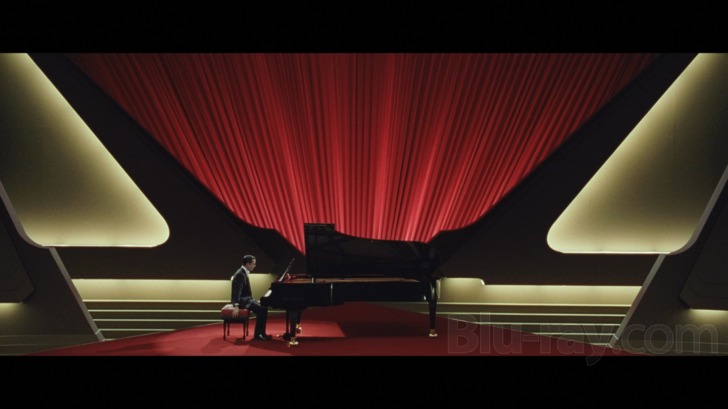
Remember the 2002 film Phone Booth, in which Colin Farrell made the mistake of answering one of the last remaining public phones in New York City and found himself pinned to the receiver by a sniper at the other end of the line? Grand Piano uses a similar device, but with considerably more backstory. Tom Selznick (Elijah Wood), the greatest classical pianist of his generation, returns to the Chicago Opera House for a gala performance in honor of his recently deceased mentor, Patrick Godureaux (Jack Taylor, in flashbacks). The event has been organized and heavily publicized by Tom's wife, Emma (Kerry Bishé, Argo), a glamorous movie star. For purposes of the event, Tom performs on Godureaux's personal grand piano, an instrument that the maestro designed and had built to his own specifications. The orchestra will be conducted by Tom's friend and former colleague, Norman Reisinger (Don McManus). But Tom is so terrified by the prospect of playing in public that he would almost prefer to have his plane into O'Hare International Airport crash. He hasn't performing for five years, not since he froze on the very same stage while attempting to play a piece written by Godureaux called "La Cinquette", which is so difficult that it is also known as "The Unplayable Piece". "La Cinquette" isn't on the program for Tom's return concert, but he's still morbidly afraid of hitting a wrong note, despite reassurances from his wife, Reisinger and his assistant (Alex Winter). Tom shortly has other concerns. As he turns the pages of Stephan Yeranosian's Piano Concerto No. 4 while on stage (both the composer and the concerto are fictitious), Tom finds handwritten scrawls warning that, if he plays one wrong note, he's dead. Proof that the messages are serious arrive in the form of a red laserscope pointer and the impact of a silenced shot from a rifle that lands near the piano bench. The killer's written messages direct Tom to a strategically placed ear piece, through which he also threatens (in the voice of John Cusack) to kill Tom's wife, who is seated in an elevated box for maximum visibility. In an orchestra seat below, Emma's star-chasing sister, Ashley (Tamsin Egerton), whines continuously to her boyfriend, Wayne (Allen Leech), that they've been relegated to a less glamorous spot. If she only knew. The purpose of the killer, who is listed as "Clem" in the credits, isn't revealed for a long time. Meanwhile, Tom anxiously scans the opera house, surreptitiously seeks help with his smartphone, argues with Clem over his ear piece, and keeps running on and off stage at breaks, never knowing whom he can trust. Clem's insistent voice always drags him back to Godureaux's keyboard, and the audience seems to accept Tom's odd behavior as the eccentricity of a troubled artist. Eventually, "The Unplayable Piece" becomes a part of the action. One of Mira's alleged qualifications for the director's chair of Grand Piano is his experience as a musician, but either he has never performed before an audience of thousands or he chose to overlook any knowledge of the experience. Screenwriter Chazelle can't have any familiarity with the performing arts, which require complete concentration on the moment at hand. (Anyone who's ever seen a performer rattled by an audience member's cell phone will know what I mean.) In addition to the technical challenges of hitting the right notes in the correct sequences and rhythms, a pianist playing a concerto must be alert to the conductor, must listen to the orchestra and must focus on the emotional arc of the musical experience he or she is attempting to create. It's an exhaustive and all-encompassing endeavor, but Grand Piano requires one to accept that Tom Selznick can do all that while, at the same time, conducting an impassioned dialogue with Clem and desperately plotting his escape (not to mention the fear for his wife and the sickening panic when Tom realizes that Clem has a confederate and that an ally on whom Tom was counting has just been killed). In the disc's extras, director Mira is described as an inveterate multitasker, and indeed Grand Piano is a thriller created by people who seem to believe that anything can be done well while doing something else. Filmmaking fosters this illusion, because it's an art form where, for a price, almost everything is repeatable, whether it's a shot, an edit or a digital effect. But the performing arts are different; they exist in moments of time that cannot be repeated, and any performer who takes their art seriously brings everything they have to each performance, because it can never be corrected. Grand Piano was made by people who fundamentally don't understand the world in which they're operating and, accordingly, have no idea of how to reshape it for an effective thriller. Let me put it in movie terms. Imagine one of those famous, edge-of-your-seat car chases from Bullitt, The French Connection, To Live and Die in L.A., Ronin or one of the Bourne films. Now imagine that, instead of focusing all of his energy and attention on driving the car, following (or evading pursuit) and avoiding a collision, our hero had to argue with an unknown assailant, figure out his motive, follow his orders and devise an escape plan. How long do you think the chase would last before he crashed the vehicle? As a concert pianist playing some of the toughest pieces in the world, Tom Selznick is already engaged in the equivalent of a high-speed car chase before Clem announces his presence, except that, as his conductor says, "it's only music". By the time Clem flashes the laserscope, Tom should crash and the concert should be over. The fact that every note keeps coming in perfect sequence serves as a constant reminder that Grand Piano is a contrivance (and a daffy one at that). That's the opposite of what a good thriller should do.
Grand Piano Blu-ray Movie, Video Quality 
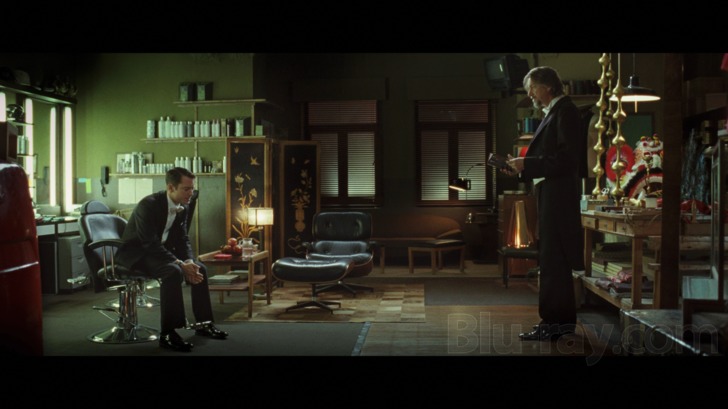
Grand Piano was shot on film by Spanish cinematographer Unax Mendía (The Adventurer: The Curse of the Midas Box), although one has to wonder why the filmmakers didn't opt for digital capture, since the footage was scanned daily for insertion into the animatic "roadmap" guiding the shoot, and also because nearly every scene involved digital effects. The project was finished on a digital intermediate, from which Magnolia Home Entertainment's 1080p, AVC-encoded Blu-ray was presumably sourced. The image has a rich, dark, saturated look, with a velvety smoothness conferred on the luxurious appointments of the concert hall, where the color scheme favors red and black. Blacks are deep and solid, and detail is exceptional throughout, whether in the scenes that mix live action and CG enhancements seamlessly, or those that are strictly CG (including the impressive opening that takes the camera inside a working piano). The many varieties of zooms, tracking shots, split screens and other camera moves have been carefully planned to maintain sharp focus on the actors' faces. Detail in faces and specifics of expressions are always visible. At an average bitrate of 24.99 Mbps, Grand Piano falls below the generous bandwidth that Magnolia typically allows, especially since it arrives on a BD-50 with significant unused space (about 12 GB). Still, the existing rate is sufficient to avoid visible compression errors.
Grand Piano Blu-ray Movie, Audio Quality 
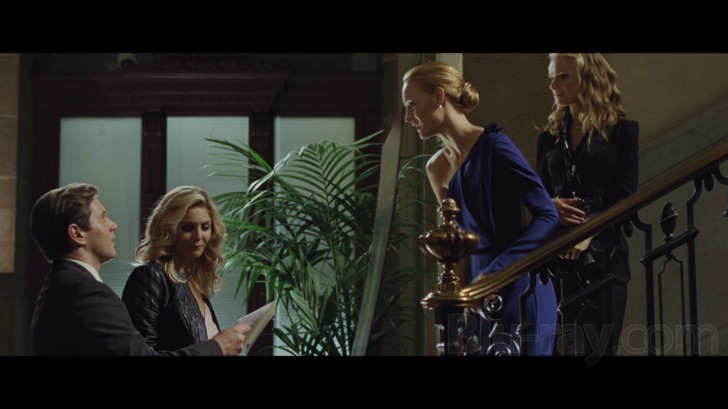
The film's original 5.1 soundtrack is reproduced here in lossless DTS-HD MA. Great care has been taken in the reproduction of the classical score for orchestra and piano created by composer Victor Reyes (Buried) to serve as the music performed by Tom Selznick. Equal care is apparent in the placement, volume and tonal quality of the score as the action of the film shifts location throughout the concert from the stage to Tom's dressing room and various other points inside the theater. The excellence of these sonic efforts is demonstrated by the fact that you're unaware of them as they're happening; they integrate seamlessly with the action on screen. A showier audio sequence accompanies the titles, which depict a CG journey through the inner workings of a piano that is being tuned. Keys are struck, mechanisms turn and hammers hit strings. Similar sequences occur later in the film under circumstances that cannot be described without spoilers. Sound effects editing also enhance several encounters late in the film that will play as suspenseful, if the viewer has surrendered to Mira's vision, and as something else if, like me, you find the whole affair impossible to accept. The dialogue is always clear, which is a tribute to the sound mixers' skill at balancing the many elements in this complex mix.
Grand Piano Blu-ray Movie, Special Features and Extras 
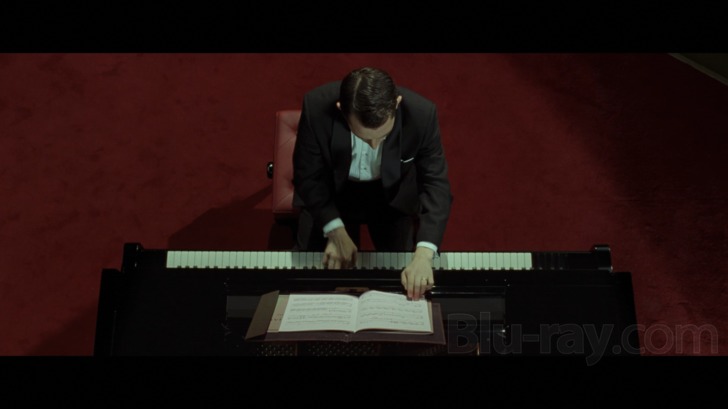
- The Making of Grand Piano (1080p; 1.78:1; 16:50): In this EPK, director, producers and other crew discuss what appealed to them about the story and the technical challenges of making a film where so much of the action must be synchronized to music. The principal cast discuss their characters. In Spanish, with English subtitles, and English.
- Interviews (1080i; 1.78:1): A "play all" feature is included.
- Director Eugenio Mira (13:58)
- Elijah Wood (20:26)
- Soundtrack (1080p; 1.78:1; 3:28): Mira and composer Victor Reyes discuss the compositions written for the concert and how they were created to serve the story. In Spanish, with English subtitles.
- Coaches (1080p; 1.78:1; 5:01): Elijah Woods and Don McManus are shown working with the professional coaches who taught them concert piano and conducting, respectively. In Spanish, with English subtitles, and English.
- Following Eugenio (1080p; 1.78:1; 4:56): A portrait of the director by the cast and producers. In Spanish, with English subtitles, and English.
- Stunts (1080p; 1.78:1; 4:07): Mira and stunt coordinator Ignacio Carreño discuss the logistics of a major action sequence that occurs late in the film. In Spanish, with English subtitles, and English.
- Visual Effects (1080p; 1.78:1; 3:26): Accompanied by numerous "before and after" comparisons, visual effects supervisor Àlex Villagrasa describes the challenges of digitally creating the film's massive concert hall and audience of thousands. In Spanish, with English subtitles.
- Wayne's Shot (1080p; 1.78:1; 4:33): "Wayne's Shot" was the nickname given to a technically complicated moment midway through the film. As various participants describe, the challenge was to follow a character moving in real time through a theater that did not exist except in the digital realm. What appears as a single shot in the finished film is actually a combination of multiple "layers", some digital, some shot on soundstages built to replicate a small portion of the theater.
- AXS TV: A Look at Grand Piano (1080i; 2.40:1; 2:52): A brief promo piece using excerpts from the film and the two interviews with Mira and Wood listed above.
- Also from Magnolia Home Entertainment: The disc includes trailers for Nymphomaniac: Volume I, Stage Fright and The Protector 2, as well as promos for the Chideo web service and AXS TV. These also play at startup, where they can be skipped with the chapter forward button.
- BD-Live: As of this writing, attempting to access BD-Live gave the message "Check back later for updates".
Grand Piano Blu-ray Movie, Overall Score and Recommendation 
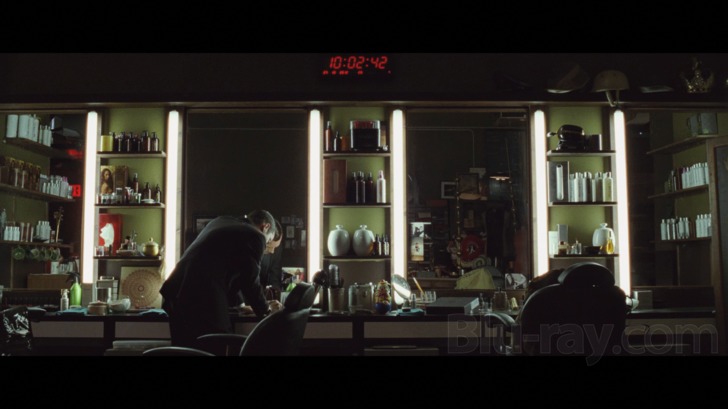
In the interest of full disclosure, I note that many professional critics were willing to accept Grand Piano's narrative devices, even while admitting that the story was preposterous. The film currently holds a Rotten Tomatoes rating of 81%. While I'm not recommending it, your mileage may vary. The disc is well-produced, and the extras are certainly thorough. As a Blu-ray, Grand Piano will not disappoint.
Similar titles
Similar titles you might also like

Red Eye 4K
2005

Breaking In
Unrated Director's Cut
2018

The Barber
2014

Killing Eve: Season 4
2022

Unlocked
2017

Pawn
2013

The Goldfinch
2019

The Gift
2015

The River Wild
1994

The Hand That Rocks the Cradle
1992

Widows
2018

Disturbing the Peace
2020

The Mule
2018

Beirut
2018

Poker Face
2022

Bad Day for the Cut
2017

Black Butterfly
2017

Edmond
2005

Billionaire Ransom
Take Down
2016

White of the Eye
1987